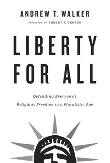Liberty For All: Defending Everyone’s Religious Freedom In A Pluralistic Age -- By: J. Alan Branch
Journal: Eikon
Volume: EIKON 03:2 (Fall 2021)
Article: Liberty For All: Defending Everyone’s Religious Freedom In A Pluralistic Age
Author: J. Alan Branch
Eikon 3.2 (Fall 2021) p. 107
Liberty For All: Defending Everyone’s Religious Freedom In A Pluralistic Age
REVIEWED BY
J. Alan Branch is Professor of Christian Ethics at Midwestern Baptist Theological Seminary. He is the author of Born This Way? Homosexuality, Science and Scripture and Affirming God’s Image: Addressing the Transgender Question with Science and Scripture.

Andrew T. Walker. Liberty For All: Defending Everyone’s Religious Freedom in a Pluralistic Age. Grand Rapids, MI: Brazos Press, 2021.
Christians often defend their own right to worship freely and live out their faith in the public venue, but are sometimes reluctant to defend the same rights for non-Christians. In Liberty For All: Defending Everyone’s Religious Freedom, Andrew T. Walker argues that if Christians truly want to be free to express their faith, they should defend the rights of non-Christians to do the same. Walker is a faculty member at The Southern Baptist Theological Seminary where he is Associate Professor of Christian Ethics and Apologetics, Associate Dean of the School of Theology, and Director of the Carl F. H. Henry Institute for Evangelical Engagement. Previously, he served as a Senior Research Fellow for the Ethics and Religious Liberty Commission of the Southern Baptist Convention. He also co-edited the Gospel for Life Series and authored God and the Transgender Debate (2017).
Eikon 3.2 (Fall 2021) p. 108
Summary
To defend the thesis that Christians should defend religious liberty for all people, Walker takes an interesting approach and combines Baptist emphases on personal conversion and religious liberty with natural law theory drawn from Catholic roots. The Baptist emphasis on conversion is seen when he says, “Entry into God’s kingdom depends on the conscience being convicted of sin and persuaded by the gospel . . . which means rationally self-chosen without external coercion” (45). Along these lines, many Christians who practice various forms of infant Baptism will find the book’s appendix quite provocative, as Walker forcefully insists the Baptist view of baptism following conversion leads most naturally to a stronger foundation for religious liberty. At the same time, natural law theory is central to Walker’s thesis, providing essential common ground among people from competing and different religious beliefs. Walker defines natural law, saying, “The idea of natural law ethics is that there are binding moral principles, governed by reason and attested to in nature, that all persons, regardless of whether they are Christians or not, are obligated to obey for their own sake and God’s” (202).
Click here to subscribe
